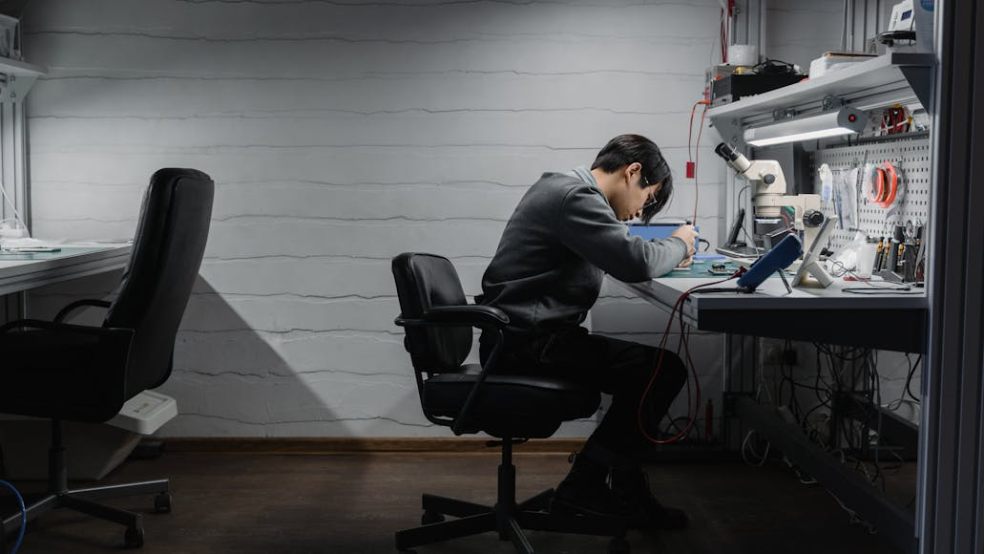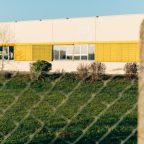
How One Belfast Business Became Northern Ireland's Tech Repair Champion: Innovation Lessons for Exeter's Digital Future
Exeter's ambitious digital transformation, from the university's innovation centre to the Science Park's tech clusters and the city centre's evolving retail landscape, can learn valuable lessons from an unexpected source. iPhix Tech NI, a family-run business that grew from a single Belfast shop to become Northern Ireland's most trusted device repair service with over 300,000 successful repairs, demonstrates how traditional businesses can harness innovation, community engagement, and strategic thinking to dominate competitive markets—insights particularly relevant as Exeter positions itself as the Southwest's digital capital.
From University Town to Tech Hub: The Belfast-Exeter Innovation Connection
The parallels between Belfast and Exeter run deeper than their shared university town status. Both cities balance historic heritage with modern innovation ambitions. Both serve as regional capitals attracting talent from surrounding areas. Both face the challenge of retaining graduates against the pull of larger metropolitan centres. How iPhix Tech NI leveraged Belfast's university ecosystem to fuel growth offers a blueprint for Exeter businesses seeking to capitalise on our city's knowledge economy.
The company transformed Queen's University Belfast students from seasonal customers into year-round innovation partners. They sponsored hackathons focused on repair technology, recruited computer science graduates for diagnostic software development, and partnered with engineering departments on material science research. These collaborations didn't just solve business problems—they positioned iPhix as an innovation leader rather than a traditional repair shop.
Exeter's businesses could replicate this model immediately. With the University of Exeter's strength in data science, climate research, and medical technology, local enterprises have untapped opportunities for collaboration. Imagine High Street retailers partnering with business students on customer experience research, local restaurants working with sports science on nutrition innovation, or service businesses collaborating with computer science on automation solutions. The key insight: treat the university not as a customer pool but as an innovation engine.
Building Tomorrow's Workforce Today: The Student Employment Revolution
iPhix Tech NI recognised that students represented more than temporary labour—they were future industry leaders worth investing in. Their student employment programme didn't just offer part-time jobs but created structured pathways from campus to career. Students began with basic repairs, progressed to customer service, advanced to technical specialisation, and some eventually managed entire departments. This investment in student development created a talent pipeline that competitors couldn't match.
The programme's genius lay in flexibility around academic schedules. During term time, students worked evenings and weekends. During holidays, they increased hours or undertook special projects. Some continued working remotely when studying abroad. This adaptability meant students could maintain employment throughout their university journey, building skills and loyalty simultaneously.
Exeter businesses face chronic staffing challenges, particularly in hospitality, retail, and service sectors. With over 30,000 students between the University of Exeter and Exeter College, the talent pool exists—it just needs creative engagement. Businesses offering genuine career development rather than just wages, flexibility that respects academic commitments, and pathways from part-time to professional roles will capture this demographic's potential.
The Digital Native Advantage: Learning from Generation Z
Rather than lamenting generational differences, iPhix Tech NI leveraged younger employees' digital nativity to transform their business. Student employees didn't just perform repairs—they revolutionised social media strategy, identified emerging market trends, and suggested service innovations that older management might have missed. Their specialist water damage repair service emerged partly from recognising how younger customers used devices in situations older generations avoided—festivals, beaches, extreme sports.
This reverse mentoring approach could transform Exeter businesses struggling with digital adaptation. Young employees understand platforms like TikTok, Instagram, and emerging technologies intuitively. They recognise trends before they mainstream. They communicate authentically with peer demographics. Businesses that empower younger team members as digital strategists rather than just operational staff gain competitive advantages in rapidly evolving markets.
The company's social media success demonstrates this principle. Rather than corporate messaging, their platforms feature real technicians explaining repairs, honest device care tips, and community engagement that feels genuine rather than marketed. This authenticity, driven by younger team members who understand modern communication, built trust that traditional advertising never could & Also read more.
Community as Laboratory: Testing Innovation Locally
iPhix Tech NI used Belfast's diverse neighbourhoods as testing grounds for service innovations. What worked in the affluent Malone area differed from student-heavy Queen's Quarter or family-oriented Lisburn. This hyperlocal approach to innovation meant new services were market-tested before wider rollout, reducing failure risks while building community connections.
Exeter's distinct communities offer similar innovation opportunities. St James, St Thomas, the city centre, and surrounding areas like Topsham each have unique characteristics and needs. Businesses that test innovations locally—perhaps trialling new services in Pennsylvania before city-wide launch, or piloting student-focused offerings around campus before broader rollout—gain valuable feedback while building neighbourhood loyalty.
The company's corporate repair programmes emerged from recognising Belfast's growing financial services sector needed different service models than individual consumers. They didn't assume what businesses wanted—they asked, tested, refined, and then scaled. This patient, community-driven innovation process ensured new services met real needs rather than imagined demands.
Sustainability as Innovation Driver
Environmental consciousness drove some of iPhix's most successful innovations. Recognising growing climate awareness, particularly among younger customers, they positioned repair as environmental activism. Every fixed device meant one fewer manufactured, reducing carbon footprints and electronic waste. This messaging resonated powerfully with environmentally conscious consumers who saw repair as supporting their values.
Exeter's commitment to carbon neutrality by 2030 makes this approach particularly relevant. Businesses that frame their services through sustainability lenses—whether repair over replacement, local over global, or circular over linear economy models—align with city priorities while attracting conscious consumers. The university's environmental science strength provides additional opportunities for sustainability innovation partnerships.
The company's component recycling programme demonstrates practical sustainability. Broken devices become parts sources for future repairs. Precious metals get extracted for recycling. Batteries enter proper disposal chains. This circular approach reduced costs while building environmental credentials. Exeter businesses could similarly examine waste streams for value recovery opportunities—restaurant food waste becoming compost, retail packaging becoming art supplies, service business materials finding second lives.
The Power of Transparent Expertise
iPhix Tech NI differentiated through radical transparency about their expertise. Their website doesn't just list services—it educates about repair processes, honestly discusses when replacement beats repair, and shares technical knowledge freely. This open expertise sharing positioned them as industry authorities rather than service providers, building trust that competitors' marketing couldn't match.
Exeter businesses often hide expertise behind professional mystique, missing opportunities to build authority through education. Imagine local solicitors explaining legal processes plainly, accountants demystifying tax regulations, or builders sharing renovation insights. This transparency doesn't undermine business—it builds trust that converts browsers into customers and customers into advocates.
The company's YouTube channel, featuring repair tutorials and device care tips, might seem counterproductive—why teach people to fix devices themselves? Yet this content marketing strategy built massive brand awareness while establishing expertise. Most viewers realised repairs were harder than expected, appreciating professional service more after understanding complexity.
Scaling Through Systems, Not Size
Growth for iPhix Tech NI came through systematic excellence rather than physical expansion. They documented every process, created training programmes ensuring consistent quality, and built quality control systems maintaining standards across locations. This systematisation enabled them to handle volume increases without proportional staff growth or quality degradation.
Exeter's growing businesses often equate scaling with physical expansion—more locations, more staff, more inventory. iPhix demonstrates that scaling can mean handling more volume through efficiency, serving more customers through technology, or delivering more value through expertise. An Exeter restaurant might scale through ghost kitchens rather than dining rooms. A boutique might scale through personal shopping services rather than floor space.
The Cultural Integration Imperative
Despite Belfast origins, iPhix Tech NI became woven into Northern Ireland's cultural fabric. They sponsor local sports teams, support schools, provide free services for charities, and participate genuinely in community life. This integration transcended corporate social responsibility, creating emotional connections that pure business relationships never achieve.
Exeter's rich cultural life—from rugby and football to festivals and community events—offers countless integration opportunities. Businesses that participate authentically rather than just sponsor commercially build resilience that sustains them through economic challenges. The companies thriving longest in Exeter aren't just located here; they're part of the city's story.
Innovation Through Inclusion
The company's hiring practices prioritised attitude over experience, recognising that technical skills could be taught but customer service excellence couldn't. This inclusive approach opened opportunities for people traditionally excluded from technical roles—older workers seeking career changes, parents returning from childcare breaks, individuals without formal qualifications but possessing practical skills.
Exeter's diverse population represents untapped potential for businesses willing to look beyond traditional recruitment. The city's refugee communities bring international perspectives. Returning parents offer maturity and reliability. Career changers provide cross-sector insights. Businesses that recruit inclusively access talent pools competitors ignore while building workforces reflecting community diversity.
Digital Tools for Physical Businesses
Despite being a physical repair service, iPhix Tech NI leveraged digital tools extensively. Online booking systems eliminated phone tag. Automated status updates kept customers informed. Digital payment options simplified transactions. These tools didn't replace human interaction but enhanced it by eliminating friction points.
Exeter businesses sometimes view digital transformation as all-or-nothing propositions. iPhix demonstrates that selective digital adoption—choosing tools solving specific problems rather than comprehensive transformation—delivers immediate benefits without disrupting successful traditional elements. A High Street shop might digitise inventory without changing sales approach. A restaurant might automate reservations while maintaining personal service.
Building Resilience Through Reputation
The company's greatest asset isn't equipment or locations but reputation. Their 4.9-star Google rating from thousands of reviews creates a competitive moat that marketing budgets can't overcome. This reputation, built through consistent excellence over years, sustains them through challenges that destroy weaker competitors.
Exeter businesses operating in our interconnected community understand reputation's importance but often underinvest in systematic reputation building. Every customer interaction, community engagement, and business decision contributes to reputation. Companies that consciously cultivate reputation through consistent excellence build assets more valuable than any physical infrastructure.
Practical Implementation for Exeter Businesses
The lessons from Northern Ireland's tech repair champion translate directly to Exeter opportunities:
For Retail Businesses: Partner with university programmes, employ students strategically, embrace transparency about products and processes, integrate sustainability messaging, and build community connections beyond transactions.
For Service Businesses: Systematise excellence enabling scaling, leverage digital tools selectively, build inclusive workforces, create career pathways from entry-level positions, and position expertise through education.
For Hospitality Businesses: Test innovations in specific neighbourhoods, engage younger employees as innovation partners, build reputation through consistent excellence, integrate authentically into cultural life, and use sustainability as differentiation.
For Tech Startups: Connect with traditional businesses for real-world testing, recognise service innovation opportunities beyond pure technology, build community connections despite digital focus, and remember that reputation matters even in innovative sectors.
Conclusion: Exeter's Innovation Opportunity
The transformation of iPhix Tech NI from local repair shop to Northern Ireland's dominant service provider demonstrates that innovation isn't reserved for tech startups or creative industries. Traditional businesses embracing strategic thinking, community engagement, and selective modernisation can achieve remarkable success while maintaining local character.
For Exeter businesses navigating our city's evolution from historic regional capital to digital innovation hub, these lessons provide practical roadmaps. Success doesn't require abandoning what works but rather enhancing strengths through strategic innovation. Whether you're running a Princess Hay café, a Fore Street boutique, or a Science Park startup, the principles remain constant: engage your community, invest in people, embrace appropriate technology, and build reputation through consistent excellence.
The question isn't whether Exeter businesses can replicate Belfast success stories but how quickly they'll adapt these lessons to our unique context. With our university resources, diverse communities, sustainability commitments, and innovation ambitions, Exeter businesses have every ingredient for remarkable success—we just need to mix them strategically.
Discover more about innovation in traditional industries at https://iphixni.com/

















